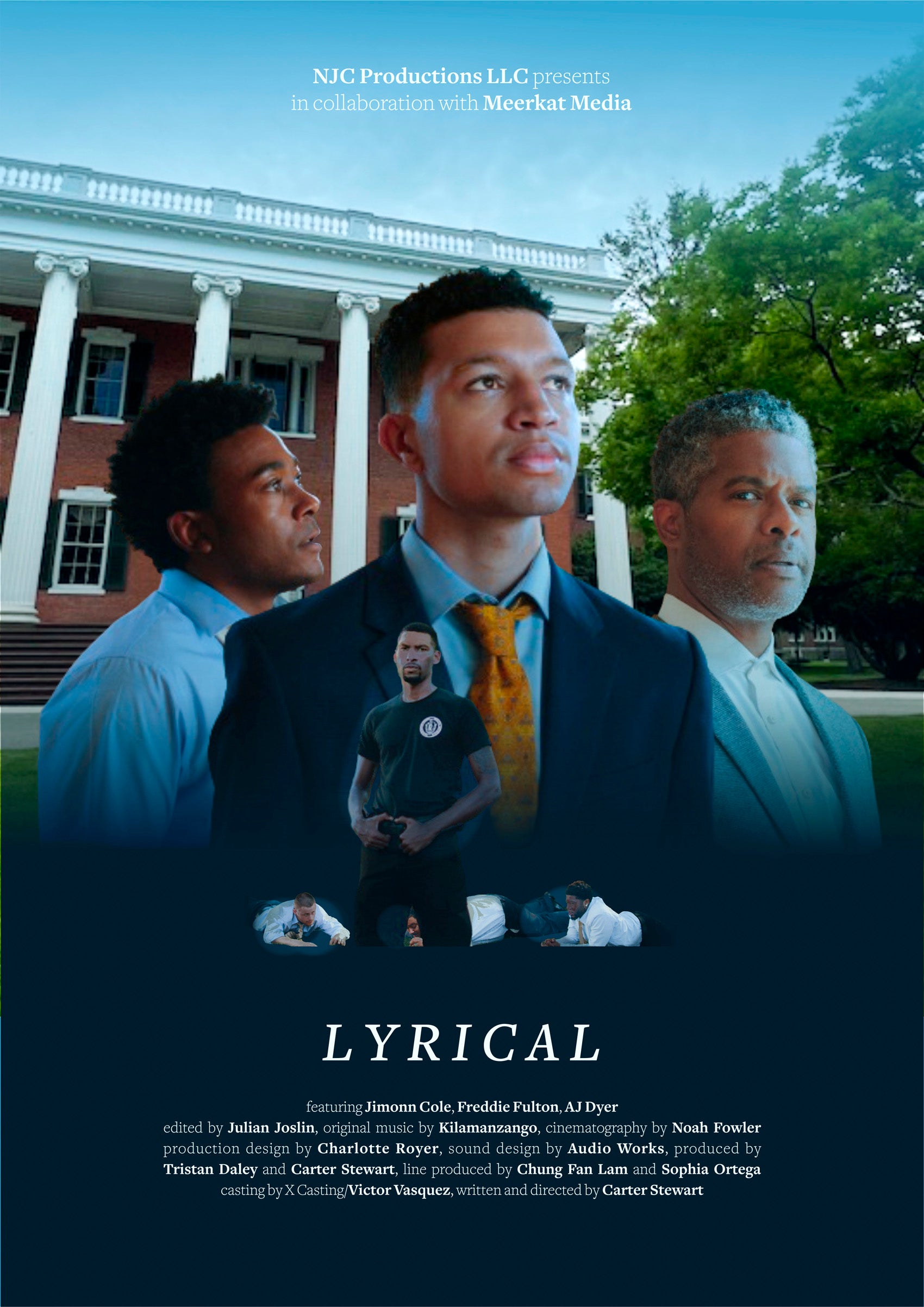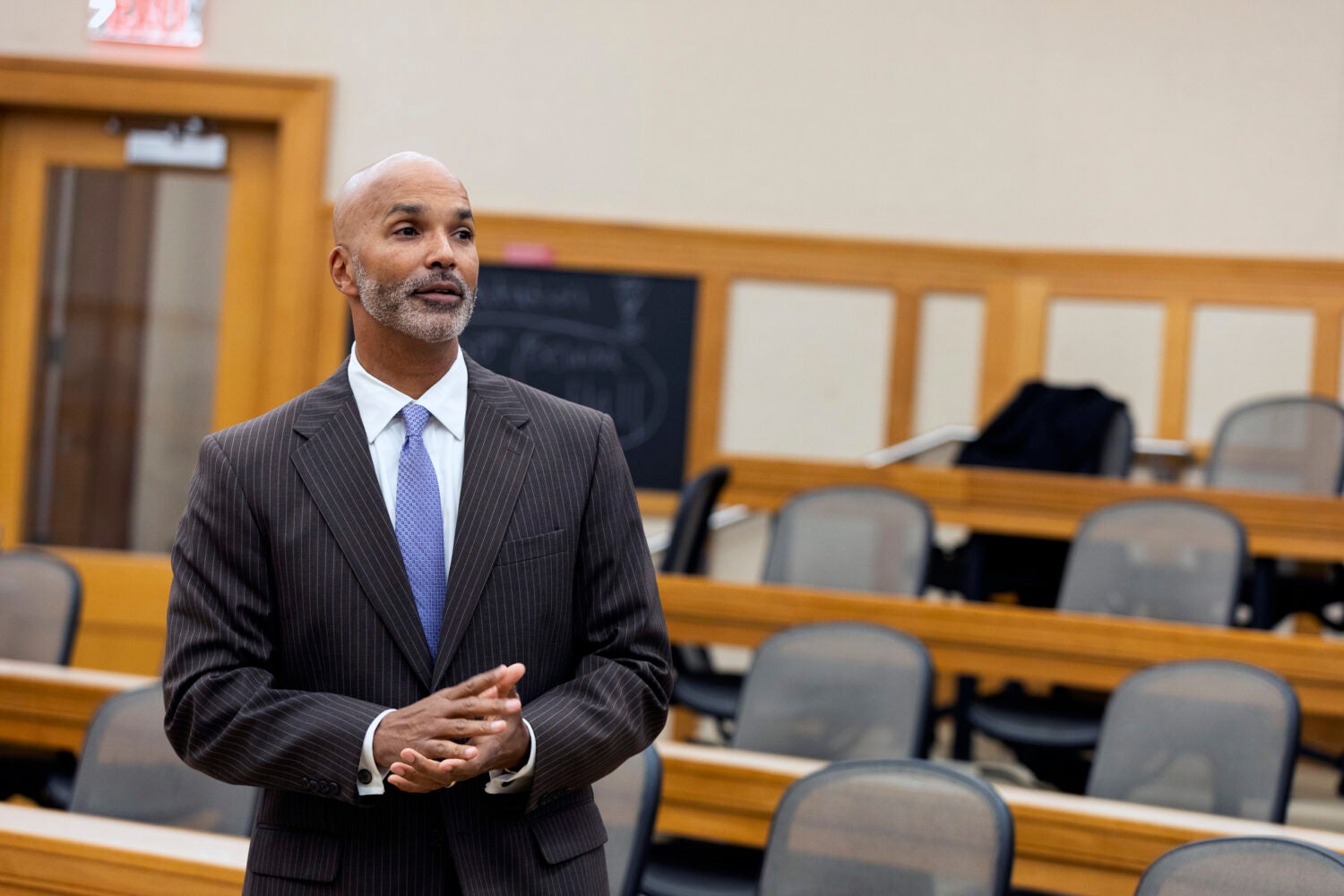Joe, a Black Harvard Law student, joins an impromptu freestyle rap session with other young men of color, formerly incarcerated people working on the Harvard campus. When a probation officer orders them all to empty their pockets, the student responds, “I’m not one of them.”
The scene is part of a new short fictional film by Carter Stewart ’97 called “Lyrical,” which was inspired by his experience as a Harvard Law student representing young people through the clinical component of a juvenile justice class and volunteering in a halfway house. The story arose out of his experience as a privileged law student working with people from dramatically different backgrounds, he said. The film, which has had screenings at film festivals and at law schools, including an event Stewart attended at Harvard Law, portrays the unfair treatment of people in the criminal justice system and warns of the dangers of seeing people as “not like us.”
“I wanted to show the humanity of everybody,” said Stewart. “Ideally [people] will see that when the kids on probation are with the students, you can’t really tell them apart. They’re all the same age. They’re all creatively expressing themselves, and there are so many commonalities and similarities. And if folks were given a chance, they likely would be able to be in the same place as the students.”

In another aspect of “Lyrical,” Joe’s father is depicted as a stern parent pushing his son to succeed. The character bears some resemblance to Stewart’s late father, Donald, who served as president of Spelman College (and earned a master’s and a doctorate in public administration from the Harvard Kennedy School). He urged his children to work hard to build wealth that would make them more secure than he was growing up faced with obstacles that Black people must overcome in America.
“He constantly told us we needed to be twice as good to be considered half as good if we wanted to succeed in life,” said Stewart, who dedicated the film to Donald. Although he didn’t always appreciate his father’s tough love when he was growing up, he now credits him with imparting lessons about effort and persistence that have helped him in life, including with finishing the film he had envisioned many years ago.
His interest in screenwriting was sparked at Harvard Law, when Professor Carol Steiker ’86 assigned students to create a script based on the TV show “Law & Order” to demonstrate what they learned in class. But he put his screenwriting aspirations aside to embark on his career, which after two clerkships began with a stint as an associate with a law firm in San Francisco. He later became an assistant U.S. attorney in the area. When he and his wife had small children, they moved to be near other family members in Columbus, Ohio, where he joined another law firm.
By then, he had been honing his screenplay, and he found a Columbus-area producer and director interested in making it into a film. But another opportunity caused him to put the film aside again.
In 2008, Stewart volunteered for the presidential campaign of Barack Obama ’91, which included serving as a delegate from Ohio to the Democratic National Convention. After taking office, Obama nominated Stewart to become U.S. attorney for the Southern District of Ohio. While grateful for the opportunity, he felt some trepidation about returning to the role of a prosecutor. He believes in the need to protect communities, yet, echoing a theme of “Lyrical,” he said he understands that the people he put in prison could have traveled a different path.
“I wanted to show the humanity of everybody.”
“The issue for me was, do they deserve all the time that they’re getting and what should have happened prior to them getting prosecuted?” said Stewart. “There was frustration about the degree of punishment and the missed opportunities to help folks much earlier in their lives.”
After leaving the U.S. attorney’s office in 2016, Stewart revisited the idea of making the film. Since he no longer had a director in place, he decided to direct it himself, despite having no experience. He took a class at the New York Film Academy and watched master classes. But most important, he said, was tapping into his experience as a leader who could execute his vision.
“I found that directing actually felt comfortable,” Stewart said. “My daughter, who was a production assistant on the set, said that she’d never seen me come alive in the way that I had as a director.”
For his next film project, Stewart is working as a producer for a documentary on Black female district attorneys, some of whom the filmmakers have followed for the past several years. He also is working on other writing projects, including a TV pilot. And he has switched careers, now working as executive vice president for programs at the Mellon Foundation, the country’s largest private funder of the arts.
“I love the fact that there’s a belief that art and culture can save the world, that the root of our humanity is in the humanities, in history, in ethics, in artistic expression, and so it feels like a wonderful place to work,” Stewart said.
After working with attorneys most of his career, he now finds that many of his professional associates are artists. But he doesn’t consider himself an outsider. Even though he hasn’t thought of himself in this way for most of his life, he is coming to understand that he is an artist too.
